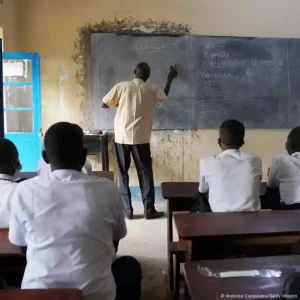After some students collapsed in class due to the extreme heat in South Sudan, the country has closed schools for two weeks.

South Sudan has ordered all schools to close for two weeks starting Friday due to an ongoing extreme heat wave that has caused some students to collapse.
According to Deputy Education Minister Martin Tako Moi, an average of 12 students have been collapsing in the country’s capital Juba every day.
This is the second time the country has taken such action. In March last year, schools were closed for a similar period as temperatures rose above 40 degrees Celsius.
The majority of schools in South Sudan have makeshift structures made of iron sheets and do not have electricity for cooling systems.
Heat wave scorches South Sudan
With temperatures expected to rise to 42 degrees Celsius, Environment Minister Josephine Napwon Cosmos urged residents to stay indoors and drink water.
“Public institutions will also operate on a half-day schedule for the next two weeks. Extreme heat can be deadly, particularly for children,” Napwon said according to South Sudanese broadcaster Radio Tamazuj.
Meanwhile, Acting Minister of Health Ayaa Benjamin Warille urged parents to keep their children indoors. She advised the public to avoid outdoor activities during peak heat hours and stressed the importance of staying hydrated.
“Drink plenty of water and don’t wait until you’re thirsty to hydrate,” Warille said according
Calls to alter school calendar
A civil society group, Integrity South Sudan, accused the government of lacking proper planning and contingency plans, saying that closing schools during heat waves shows a “failure to prioritize the education of South Sudan’s children.”
Education workers have urged the government to consider changing the school calendar so that schools close in February and reopen in April when temperatures drop.
Abraham Kuol Nyuon, the dean of the graduate college at the University of Juba, said that the calendar should be localized based on the weather in the 10 states.
South Sudan is one of the world’s youngest nations and is highly vulnerable to the effects of the climate crisis. The country has faced years of civil conflict, compounded by recurrent droughts and floods that have severely affected living conditions.
Edited by: Louis Oelofse
DW News


